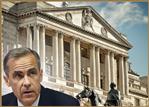
Bank of England policymakers voted unanimously to keep the key interest rate and asset purchases unchanged as the economy showed resilience to the 'Brexit' shock.
The central bank today raised its near-term growth and inflation forecasts as the depreciation of sterling lifted import prices, while boosting exports.
The Monetary Policy Committee, headed by Governor Mark Carney, unanimously decided to hold the key bank rate at a record low 0.25 percent, the government bond purchases at GBP 435 billion and corporate bond purchase plan at GBP 10 billion. The decision was in line with economists' expectations.
The BoE removed its statement from September that majority of members expect to support a further cut in Bank Rate. Instead, the bank said the "monetary policy can respond, in either direction."
The MPC also judged it was appropriate to accommodate a period of above-target inflation than allow a more modest increase in unemployment, Carney said in a press conference after the decision.
Carney assessed that this impact of a weakening sterling on inflation will "ultimately prove temporary". However, there are limits to the extent to which above-target inflation can be tolerated, the bank added.
In the Inflation Report, the bank forecast inflation to rise above the 2 percent target within the next twelve months and only to begin to fall back in the second half of the three-year forecast period.
Inflation is projected to reach 2.7 percent by the fourth quarter of 2017, which was bigger than the 2 percent estimated previously. The outlook for 2018 was raised to 2.7 percent from 2.4 percent.
The bank said the near-term growth outlook was stronger. The bank lifted its GDP outlook for this year to 2.2 percent from 2 percent.
The growth projection for next year was raised to 1.4 percent from 0.8 percent. For 2018, the bank forecast 1.5 percent expansion, faster than the previous projection of 1.8 percent.
"Conditional on a path for market interest rates that reaches 0.4 percent by late 2019, four-quarter GDP growth is likely to slow to around 1.5 percent," the bank said.
British Chambers of Commerce Head of Economics Suren Thiru said the BoE is likely to face a tricky, near-term balancing act between supporting a slowing economy and managing a sustained period of rising inflation.
Carney said the bank has neutral bias on policy going forward. He also stressed that "the biggest determinants" of the U.K.'s medium-term prosperity will be the country's new relationship with the European Union.
In August, the bank had announced a rate cut and a massive quantitative easing expansion to shield the economy from the shock from the 'Brexit' vote late June.
Governor Mark Carney has come under fire for being too pessimistic after the 'Brexit' vote. Late last month, he was asked to justify the loosening stance adopted in August at the parliament, when he said policymakers cannot ignore the recent sharp drop in the sterling.
Settling questions about his term in the central bank, Carney this week confirmed he will stay as BoE chief until June 2019, which is two years short of the expiry of the term. He expressed wish to guide the monetary policy through the period of crucial 'Brexit' talks.
Prime Minister Theresa May had said the Article 50 will be triggered by late March next year, starting exit negotiations with the EU.
However, the U.K. High Court ruled on Thursday that the government must seek Parliament approval before triggering the Article 50. The May government has appealed the decision.
by RTT Staff Writer
For comments and feedback: editorial@rttnews.com
Business News

